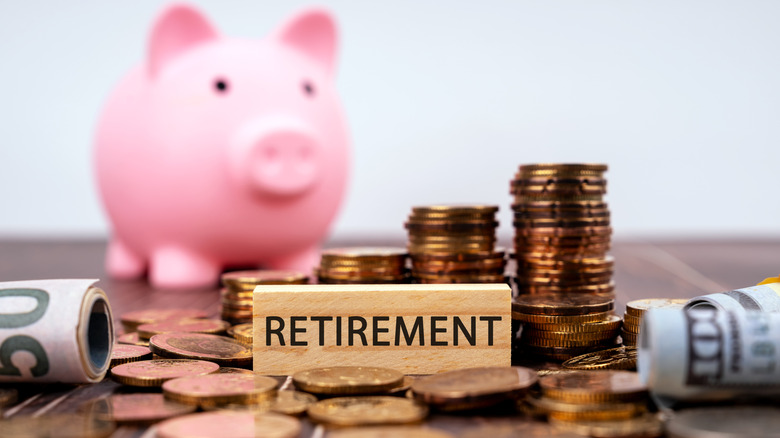You'll Never Be Able To Retire If Your Income & Spending Follow This Common Pattern
You work hard in hopes that someday you'll finally reach that magical milestone when you can retire and live out your golden years comfortably. However, one common habit may be making it nearly impossible for you: spending more than you earn. Living within your means is easier said than done, and the truth is that many of us spend more than we make, relying on credit to get by and not saving nearly enough for retirement. In fact, a Gallup poll from 2023 found that only 43% of Americans feel they will be financially comfortable in retirement, and according to a survey conducted by the Federal Reserve, only 54.3% of Americans had a retirement account in 2022.
When you retire, your earning years are technically behind you and you're likely to find yourself on a fixed income. This means that, on top of having money set aside to live the way you want to, you'll need to have your spending under control. And if you are living beyond your means now, you may never get caught up enough to set money aside for retirement and could find yourself in the same pattern of struggling to survive on a fixed income in the future.
How to break the cycle
It would be easy to say that anyone looking forward to retirement should just save more, but that's not always a realistic option considering that, according to Bankrate, one in three Americans are living paycheck to paycheck. Which brings us back to the issue of living beyond your means. Once you've come to terms with the fact that you are spending more than you earn, you can start working on a plan to fix the problem and break the cycle. Take stock of what your expenses are and work on identifying areas where you can cut back. Easy, short-term ways to cut back on expenses including making simple changes such as eating out less, making coffee at home instead of splurging on expensive coffee shop coffee every day, and sticking to a shopping list at the grocery store so you only buy what you need and avoid impulse buys.
If you're not aware of where your money is going each month, consider keeping an expense journal. Write down every purchase you make for 60 days and when you are done, you should have a better understanding of your spending patterns. From there, you can make a more informed decision about what expenses you can either cut back on or cut out completely. Creating a monthly budget and sticking to it is another way to help keep yourself on track and avoid unnecessary expenses.
Ways to Increase Your Retirement Savings
If you want to retire (and live comfortably while doing it), set yourself up now while you are still in the earning phase of your life. Luckily there are some things you can do to start increasing your nest egg once you've gotten your spending under control. If your job includes 401(k) benefits or something similar (like a 403(b) plan), make sure you are taking advantage of it. These plans let you set aside money pre-tax and usually include an employer match, which is like getting free money for retirement. This match is a great way to grow your retirement account quickly. By having your 401(k) contribution taken directly out of your check, you won't be tempted to spend that money elsewhere.
Earning more money is easier said than done, but if you aren't willing or able to trim your expenses, then you might want to consider ways to increase your income, like taking on additional work if possible. This could mean getting a temporary job in order to get caught up on bills or it could mean a permanent side hustle that lets you make the most of your hobbies, skills, or interests. Approximately one-third of Americans have a side hustle and one of the primary motivators for having one is to earn extra cash, indicating that many Americans are pursuing this option to help balance what they spend with what they earn.


